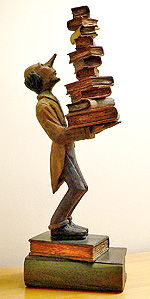Evidence 3 of Competency A
In which I show my understanding of the values and fundamental principles that guide library and information professionals. The text on this page is the relevant excerpt from the Final Exam of the Information and Society class, Spring of 2005. Below is the link to the full document, which consists of four essay questions.
This document is in iPaper format, which requires ADOBE FLASH PLAYER to view it. Clicking on [PDF] link the document will open in ADOBE ACROBAT READER.

Statue of a Librarian in HUNTINGTON LIBRARY, ART COLLECTIONS AND BOTANICAL GARDENS,
San Marino, California.
Photo Vlasta Radan, 2006.
Q1. Discuss the merits of the statement, “all knowledge carries equal weight."
The statement that all knowledge carries equal weight would imply that we somehow have a way to "weigh" knowledge against some uniform objective measurement. However, that is absolutely impossible because the worth of knowledge could be judged only by the individual user, and even then the worth and weight of the knowledge depends on varying circumstances. But exactly that uniqueness is what makes all knowledge of equal worth – in the same way that all people are created equal and are different at the same time. And these people whose diversities are equally valuable create the knowledge that carries equal weight.
At first glance, there is the obvious difference between the knowledge of writing novels and the knowledge how to fix a broken bone. The practical knowledge of healing, cooking or agriculture is clearly and empirically crucial for human survival. All knowledge of Hamlet would not help anybody to land a damaged plane or bring a ship to harbor. This would apparently show that knowledge could be measured toward some specific objectives – knowledge how to grow or prepare food or how to fly a plane. But knowledge is much more subtle than the technical, practical aspect of knowing "how things work."
As James Burke (1978) shows through his book and TV series, the connections between bits of knowledge and how they will be used and developed by humans are not always straightforward. Things that have no apparent value or seem dead wrong could be the beginning of a mayor road of discovery. The knowledge pursued and accumulated through medieval alchemy was the beginnings of modern chemistry. In 1776 Luigi Galvani observed an unusual connection between the twitching of frog's legs and the discharge of electrical sparks with which he was experimenting. His observation led him toward a theory about "animal electricity." Although in retrospect, we know that his "knowledge" was erroneous, his experiments were important stepping stones toward the general knowledge of electricity.
However, it would be wrong to weigh knowledge only in terms of being part of some practical knowledge. The worth of the knowledge is given and weighed by people. Their ideas, creativity, and use have equal weight as their creations. The retired manager of Herman Miller Inc., a furniture company, Max De Pree (1997) explains the essence of his management philosophy which is based on respect of every human being with the statement that "each person is made in the image of God" and that we are all "God's mix" making us, our creations, potential as well as knowledge we possess uniquely equal.
Reference:
De Pree, M. (1997). Leading without power: Finding hope in serving community. San Francisco: Jossey-Bass, Inc.
Burke, J. (1978). Connections. Boston: Little, Brown and Company.
This web site was developed to satisfy the graduation requirements for
the School for Library and Information Science at San Jose State University California
Text, design, and digital imaging by Vlasta Radan